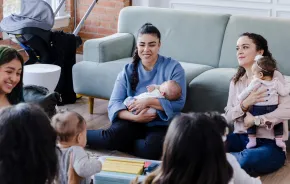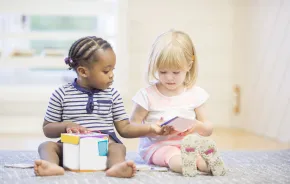 Parents discover early on the power of music. You sing a lullaby, and your infant is soothed. You make up a silly song about brushing teeth or putting on socks and your toddler makes it through a tough transition. You happen upon a guitar-and-fiddle duo at a farmer’s market and your shy preschooler is a whirlwind of improvisational dance.
Parents discover early on the power of music. You sing a lullaby, and your infant is soothed. You make up a silly song about brushing teeth or putting on socks and your toddler makes it through a tough transition. You happen upon a guitar-and-fiddle duo at a farmer’s market and your shy preschooler is a whirlwind of improvisational dance.
What makes music so magical to young children? “You might as well ask why language matters,” explains Lisa G. Allison, the music director of Let Your Music Shine! with Lisa and Linda!. “The human voice is music to a baby’s ear, filled with organized patterns and sounds. By providing music to the youngest ear, the child is provided with a richer, deeper, and more expansive array of sounds to form their cognitive potential."
"Beyond cognition," she adds, "shared music making develops deep, joyful bonds for parents and children.”
So true, but also easy to forget in the get-it-done rush of daily life. Luckily, there are countless ways to integrate music into your child’s daily life during the early years and beyond. For inspiration, we asked local early-childhood music educators for their top ways.
1. Sing. This is a natural — many parents sing to their baby from the first days of a baby’s life instinctively. But it’s worth appreciating how essential it is. “Nothing is more important for a child's musical growth than seeing their loved ones modeling music making with enjoyment,” says Summer Rognlie Trisler, director of Sunshine Music Together, which runs a variety of parent-child music classes in the Seattle area. And if you do play an instrument at any level, make time to play it around your child, even if it's just a few minutes a day.
Sing to your baby in pregnancy, too. “Hearing is the first sense to be fully developed in utero at 20 weeks … so start then!," says Allison of Let Your Music Shine! "The earlier the sound/vibration stimulation, the earlier the brain wires for language and future sound engagement."
2. Incorporate music into day-to-day activities. There’s a reason why clean-up songs are standard preschool practice. “Create songs out of brushing your teeth, taking a bath, getting dressed, getting in the carseat,” suggests Trisler of Sunshine Music Together. "It's so very simple for us to do, but profound for your child's music development.”
3.Sing songs without words. In her classes, Trisler teaches caregivers learn to sing songs without words, using simple sounds (called "vocables") like ba, dee or la. “This gives your child the experience of pure tonality and pure rhythm without the distraction of words,” she notes.
 4. Move! “Carry and bounce [babies] to the beat, move their arms up and down to the melody, sing to them,” says Linda Sebenius, who directs Let Your Music Shine! with Allison. "As they are more language ready, add words to the movement, instrument names to the sound, words to describe simple concepts like high/low, fast/slow, short/long.”
4. Move! “Carry and bounce [babies] to the beat, move their arms up and down to the melody, sing to them,” says Linda Sebenius, who directs Let Your Music Shine! with Allison. "As they are more language ready, add words to the movement, instrument names to the sound, words to describe simple concepts like high/low, fast/slow, short/long.”
Katy Webber of Musikal Magik, who teaches at community centers and preschools around Seattle, recommends learning songs that uses hand gestures, such as “Twinkle, Twinkle Little Star” or “Six Little Ducks.” “Not only is it fun for kids, but “it’s a great way to keep your child's hands and mind busy while you're stuck in the check-out line or traveling.”
5. Play what you love. “Remember that children learn by watching and imitating you, they are acquiring a disposition for music from you,” says Sunshine Music Together's Trisler. “If you love rhythm and blues, share that with your child. If you love the Beatles, play the Beatles! Parents need to give themselves permission to model how much fun music is.”
6. And explore new terrain. What's more fun than trying new tunes with your child? Take her to a Spanish-language concert or check a jazz CD out from the library. “You can say today is country music day and listen to the beat, dance to it, play marching band.” recommends Heather DeJesus, a mom of two and Kindermusik teacher.
7. Weave in classical: “Classical music is a great way for you and your child to learn about instruments and to help build your child's aural development to better prepare him or her for the classroom,” says Webber of Musikal Magik. “Choose a favorite classical piece and see if you can name the individual instruments.”
“Classical music has it all, and often within one piece of music: fast and slow, loud and soft, high and low — all those beginning concepts of music,” says Sebenius of Let Your Music Shine! (Lisa and Linda perform at the Seattle Symphony's Tiny Tots concert series). "And classical music is very mathematical — 1/4 notes, 1/8 notes, 1/2 notes, whole notes, duple rhythms, triple rhythms, all creating strong neuro-pathways through musical patterns that later add up to higher math skills.”
 8. Have instruments around. Put small instruments like shakers and small drums in a basket of them that's easily reachable by small hands. “Small rhythm instruments are great for building fine motor skills and nurturing a steady beat,” says Webber.
8. Have instruments around. Put small instruments like shakers and small drums in a basket of them that's easily reachable by small hands. “Small rhythm instruments are great for building fine motor skills and nurturing a steady beat,” says Webber.
When they’re older, add blowing instruments — "a kazoo or slide whistle, “then the recorder at about age 5,” says Sebenius of Let Your Music Shine!. “This is a great instrument to combine blowing, fingering and simple music concepts."
Small ukeleles, which you can easily find secondhand, are another fun instrument to have around and easy for a child to pick up and strum.
9. Encourage kids to use both hands. “Having them play an instrument in which both hands are used helps to engage both sides of the brain and prepares them for a more sophisticated instrument such as a violin, guitar, or piano,” says Webber.
10. Make your own! A classic DIY strategy, of course, is to pull out some pots and pans and a wooden spoon, but other percussion instruments are easily made. "Take a coffee can and put beans in them," says Kindermusik's Heather DeJesus. "Or take a plastic bottle, fill it in with beads and trinkets."
11. Don’t worry if you’re not “musical.” "We have many parents in our classes who come to us having had no musical nurturing during their childhood and are therefore incredibly shy and uncomfortable participating in class,” says Trisler. "I assure them that their child thinks that they have the best voice in the world!"
12. Don’t be afraid of repetition. As any parent knows, young children adore hearing the same song over and over. “They’re really processing it in their head; hearing the voice and saying 'my voice can make that sound,'” says Heather DeJesus. "All of a sudden they’ll be harmonizing.”
13. Take a class together. The number and array of music classes for very young children has increased dramatically in recent years. Beyond the fun of taking a class together, it will give you new songs, activities and movement to bring home. Many parent-child movement classes (such as those offered by Shoreline's Creative Dance Center) also integrate a wide variety of music in classes.
14. Go see live music. Local coffee shops, farmers markets and festivals of all sorts often have live performers, and are a fantastic way to expose your kids to new kinds of rhythms and songs, including the Northwest's thriving kindie music scene. Bookstores and libraries often have musical story hours. Seattle Symphony has a wonderful Tiny Tots concert series and also plays at several free community concerts a year. Churches will often host concerts that are kid-friendly, such as First Baptist's monthly Jazz Vespers service.
Resources - classes
Baby Jam, a multilingual interactive percussion and movement class for kids ages birth to 5 years old
Music Together, including Sunshine Music Together in Seattle
Musikal Magik with Katy Webber
Kindermusik, including Studio3Music in Redmond and Kindermusik with Heather
Let Your Music Shine! with Lisa and Linda (which has free music downloads)
Jamtown, a Seattle-based Fair Trade music store that offers toddler lessons and family music classes
Musikgarten, with four Seattle-area locations
ParentMap's Golden Teddy winners for music classes
How to start your own toddler music group
ParentMap's directory of music classes
Resources - family music shows
Seattle Symphony's Tiny Tots concert series











